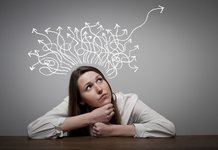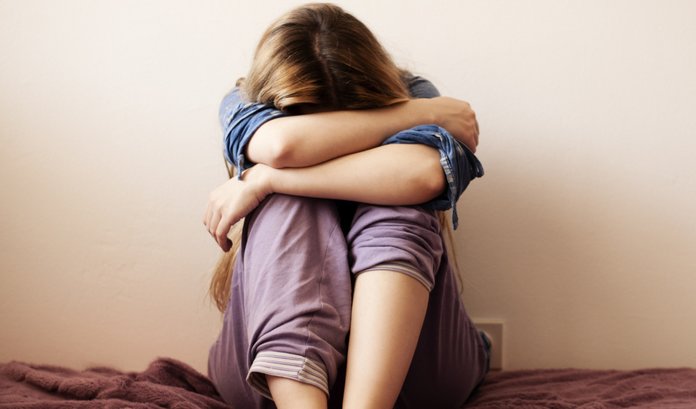
Depression, from the Latin deprimo (“crush”, “crush”) - a type of mental disorder in which there is a sharp decrease in mood and the appearance of apathy, sometimes anhedonia, i.e. inability to have fun. Depression has many symptoms, the vast majority of which are negative.
In some cases, a depressive state can be a normal temporary reaction to difficult life circumstances and incidents, in others it occurs for no reason and lasts a very long time. Depression is treatable, and is currently the most common mental disorder.
Types of Depression

Psychotherapists distinguish about sixty forms of depression, however, according to WHO statistics, the most common forms for women are:
- Bipolar. One of the most severe forms of depressive disorders, alternating ups and downs of mood. Thinking assumes a manic character during the periods of jumps, but during breaks a person has a normal mood. Manic-depressive syndrome with bipolar disorder is difficult to treat, and bursts of mood can cause a person to perform crazy actions, sometimes to the detriment of oneself or others;
- Postpartum. Often ignored not only by others, but also by the woman herself due to erroneous skepticism in relation to her. In fact, postpartum depression that develops in young mothers is one of the most severe, affecting psychosomatics and causing asocial behavior, and in severe cases, postpartum psychosis. It is extremely dangerous to leave postpartum depression unattended; such a disorder causes delusions, hallucinations and suicidal impulses. This form lasts from a couple of months to two to three years;
- Large (monopolar or clinically pronounced). Accompanied by melancholy, decreased self-esteem, mood swings and general lethargy, a mental illness requiring medical attention and taking a number of antidepressants in a protracted form;
- Psychotic. Hallucinations and changes in consciousness are added to the general depressive symptoms. With psychotic depression, there is a high chance of suicide;
- Seasonal. Often diagnosed in women, it is spring and autumn and occurs against a background of changing cycles: hormonal and planetary. It can flow into much more complex forms if a woman cannot cope with it;
- Disturbing. It is classified according to the pronounced and unnatural anxiety of a woman for loved ones, her health or well-being, especially if there is no reason for worries;
- Dystrophic. Extremely negative form, accompanied by outbursts of anger with longing, irritability, resentment and nervous breakdowns. A woman is frustrated by others due to mental illness, but not fatigue or character traits. A severe dystrophic form fuels a woman’s aggression and may cause a desire to harm someone or break the law;
- Adynamic. The main ghost of this type of depressive disorder is extreme exhaustion of the psyche: a woman gets tired all the time, quickly loses her strength, constantly feels weak and tries to fence herself off from others;
- Asthenic. This form is characterized by a complete dulling of feelings, emotions, and the ability to respond to environmental fluctuations. What used to please a woman now only causes her bewilderment at what she used to find in this;
- Somatized. Women with somatic disorders all the time complain of feeling unwell and even cause symptoms of various diseases, from which doctors often try to treat them to no avail. Some studies suggest that half of the outpatient clinics actually suffer from somatic depression;
- Ironic or "smiling". With this form of depression, women maintain their usual activity and respond to everything with laughter and sarcasm, but this protective reaction is a serious illness, sometimes leading to suicidal attempts;
- Tearful. Appears in both men and women. It is characterized by excessive self-pity and reproaches towards others about an alleged lack of attention and care.
How to diagnose depression?
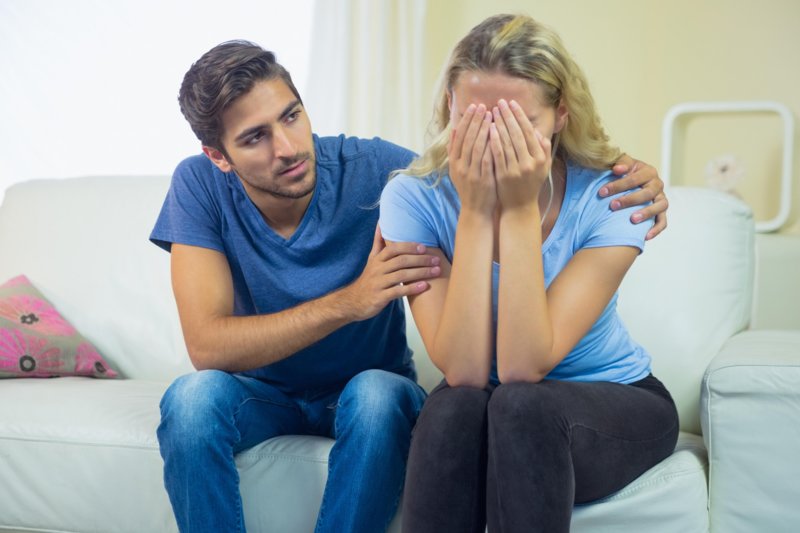
The surest way to diagnose the symptoms of depression is to consult a graduate. A specialist who treats depressive disorders can be a psychologist, psychotherapist or psychiatrist, in some cases a neurologist.
You can go to a therapist with depression, but he can only prescribe antidepressants and be referred to a doctor specializing in your illness. It is best to immediately visit a psychotherapist or psychiatrist at the first sign of depression.
With any form of depression, it is extremely important to make an appropriate diagnosis and get the right treatment, if necessary.
For preliminary diagnosis of the disorder, psychological tests can be used: the Zang scale for self-assessment of depression or the Beck depression scale.
Regardless of the type of depression, its course is divided into stages according to severity. Each of the stages has its own symptoms, according to which it is diagnosed:
- Easy stage (dysthymia). It may end in complete recovery in the absence of drug treatment. It has mild symptoms and may be chronic. A woman has been living with depression for years, but she does not even suspect it because of the decrease in the hormone serotonin in the blood. Symptoms appear such as incessant sadness, sleep deprivation, hopelessness, guilt, helplessness, unwillingness to live, gastrointestinal tract diseases, headaches and joint pains, thoughts of suicide.
- Middle Stage (Clinical Depression). A woman is almost constantly in a depressed, oppressed, often malicious state, and this is noticed by others. Efficiency drops to a minimum, the need to contact with others causes rejection, movements become constrained and slow.
- Severe depression. A strong and deep form in which external disturbances are added to psychosomatics, in particular in the field of nutrition and hygiene. A woman ceases to monitor herself, closes herself and does not leave the apartment, trying to ignore the existence of the outside world and reducing her activity to zero. These types of depression require inpatient treatment. They also include postpartum syndrome and postpartum psychosis.
Causes of Depression in Women
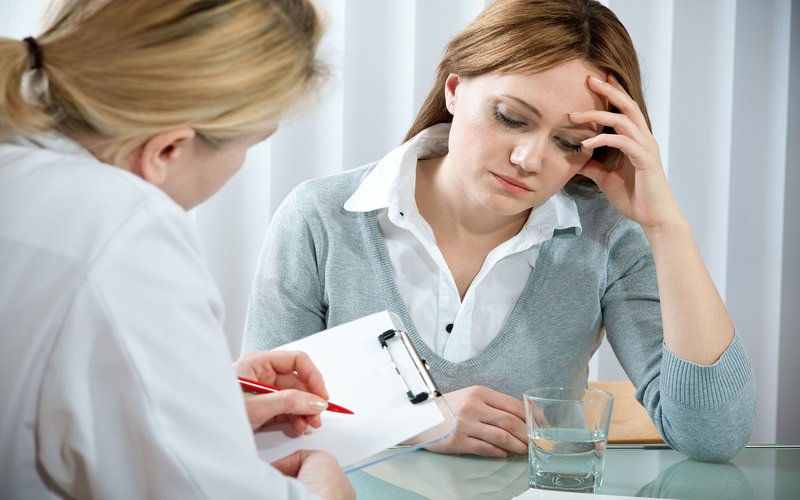
The reasons why women suffer from depression can be genetic, biochemical, social or age-related. It is not always possible to correctly determine the source of prolonged depression, but understanding the problem greatly facilitates the search for a solution to it. So, the causes of depression can be:
- Genetic factor. More relevant to the clinical forms of depression.If a disease occurs in the family, it can manifest itself by inheritance, however, 100% risk does not guarantee;
- Biochemical factor. According to studies, in women with major depression, the biochemical parameters of the brain differ from healthy ones mentally. Depression can also be caused by certain medications, especially hormonal ones;
- Social factor. The most common cause of depression is the negative impact of the environment. Severe stress, with which the female psyche could not cope, provokes a breakdown and causes depression. This can be the death of a loved one, conflicts with relatives, violence, childbirth, problems of a financial and labor nature, discord in personal life and marriage, abuse of alcohol and drugs - all this causes depression and exacerbates it;
- Psychological factor. Some character traits, such as a tendency to pessimism or a melancholy temperament, affect the susceptibility to depressive disorders in a bad way;
- Age factors. Women are most susceptible to mental disorders during hormonal changes (in adolescence, in reproductive and elderly). Changes in the physical plane are stress for any person, and women whose body is rearranged with each age period experience more than one turning point in their lives: the beginning of the menstrual cycle, pregnancy, the postpartum period, and the menopause.
The causes of depression may be different, but without a serious attitude to finding out the problem that causes it, it will be much more difficult to cure depression.
How to get rid of depression?
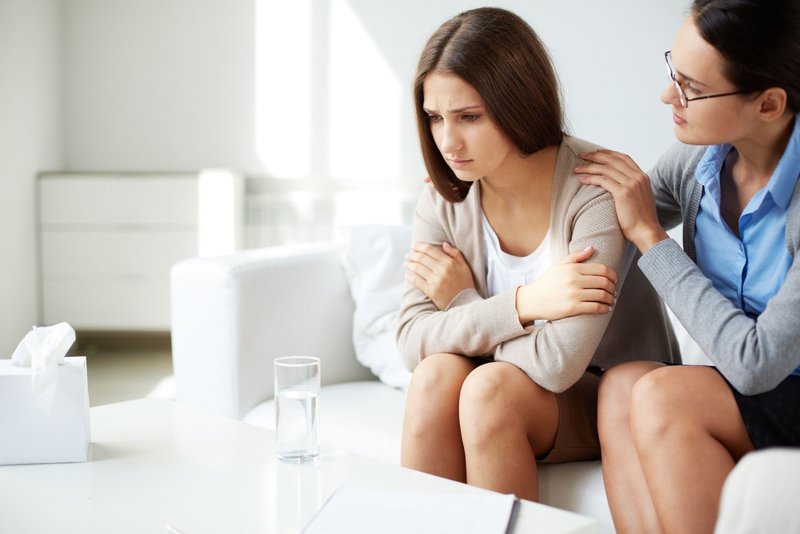
Depression, despite a wide range of frightening symptoms and uncertain prospects, can be treated very easily in the initial stages. In order to prevent depression, psychologists recommend that the following rules be observed even at the first “calls”:
- To isolate oneself from relatives and acquaintances that cause negative emotions in you;
- Observe the daily regimen and get enough sleep;
- To lead a healthy lifestyle, giving up bad habits;
- Eat regularly, tightly and wholesomely;
- Move, go out into the fresh air;
- Avoid stress
- Surround yourself with nice people, keep in touch with friends.
- Find a new hobby, carry yourself interesting business.
If depression does occur, there are two ways out: consult a doctor or try self-treatment at home.
Many women are afraid to turn to specialists when they face the problem of depressive disorder, but there is nothing to worry about. Psychotherapy and drug treatment are the fastest way to get rid of depression. 10-30 sessions of an experienced psychotherapist will help get rid of her completely, and they will only be hospitalized in acute clinical cases, and often patients no longer realize that they need help.
Remember! In no case do not take medications to treat depression without first consulting a specialist.
In general, traditional medicine provides the following drugs for depression:
- Antidepressants;
- MAOI (mininoamine oxidase inhibitors);
- Lithium salt;
- Carbamazepine and valproate;
- Complex medicines.
At home, moderate depression is much more difficult to treat, but here you can’t sit back. Psychologists recommend:
- Use decoctions of herbs that help stabilize the emotional background (St. John's wort, chamomile, lemon balm, mint, ginseng, motherwort, ivan tea, valerian root);
- Eat foods rich in serotonin: bananas, nuts, carrots, include any fruits in the daily diet;
- Take relaxing evening baths with decoctions of herbs or honey;
- Eliminate junk food, seasonings, cigarettes, coffee and alcohol from the diet;
- To do auto-training;
- Visit the bathhouse, pool, temper the body;
- To engage in self-development, a hobby, a new business;
- Pay attention to sports and movements: running, yoga, cycling;
- Remove stressful factors from life: unloved work, the negative impact of the environment, boring hobbies, imposed worries;
- Sleep at least 8 hours a day;
- Take vitamins.
The main motivating factor affecting the treatment of depression is the desire to get rid of it. If it appears, then the patient is already recovering. It is important not to stop, to believe in oneself, to look for sources of positiveness and to raise one’s self-esteem by all means.











